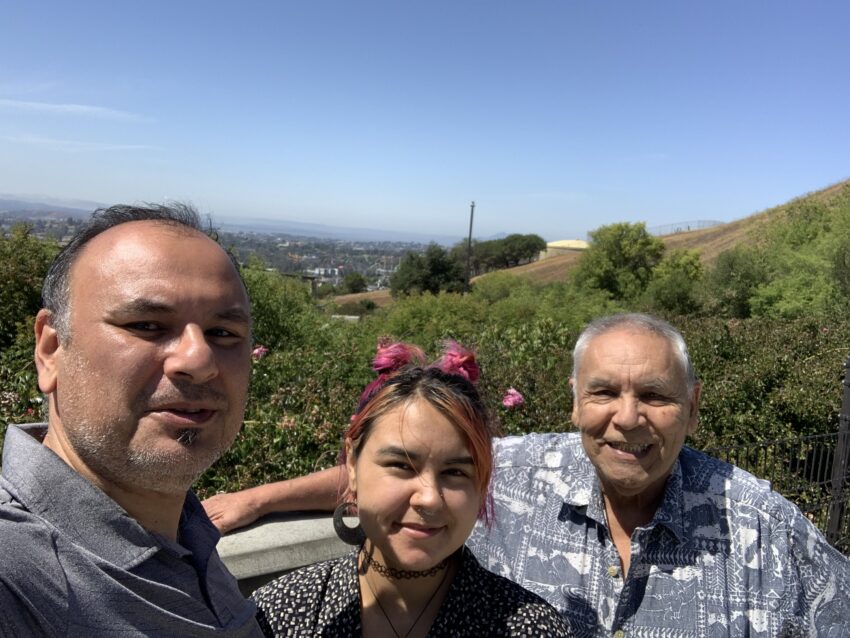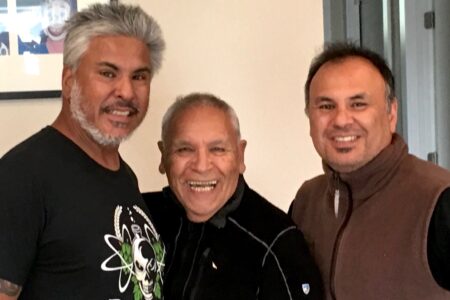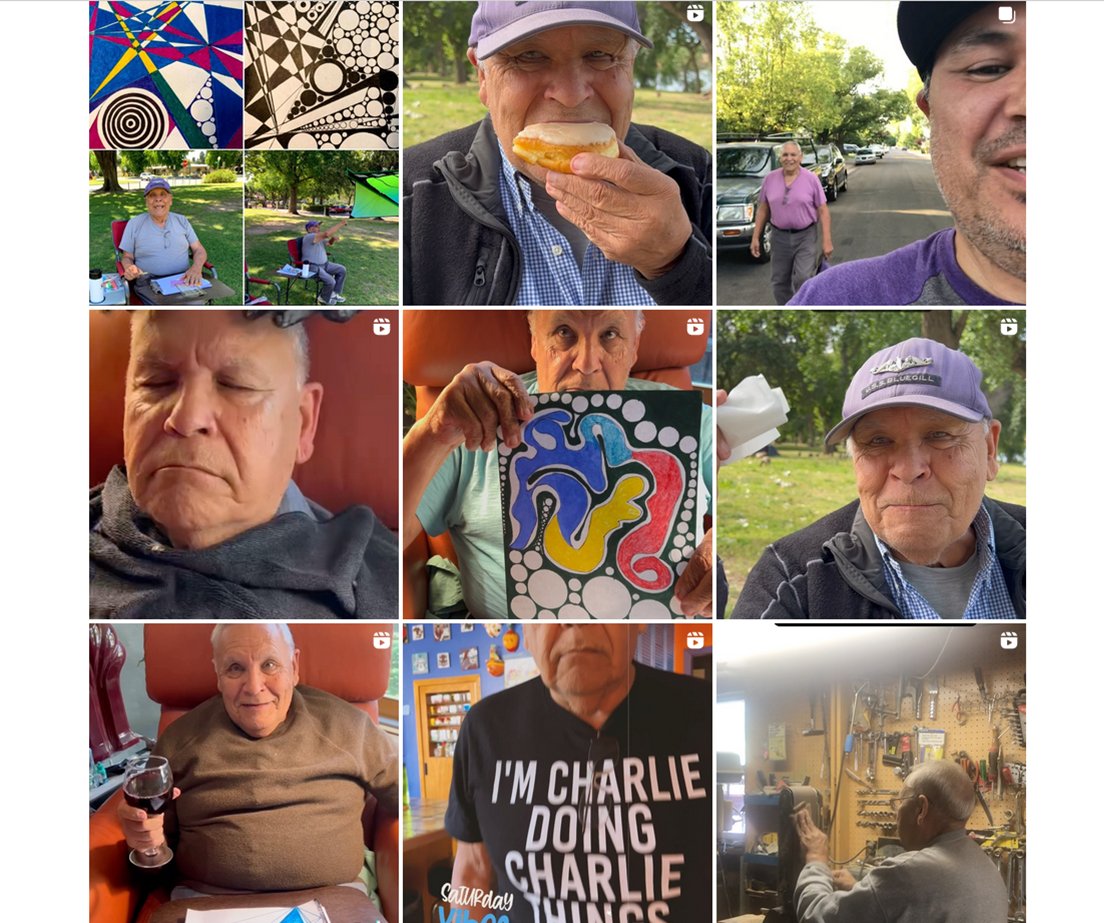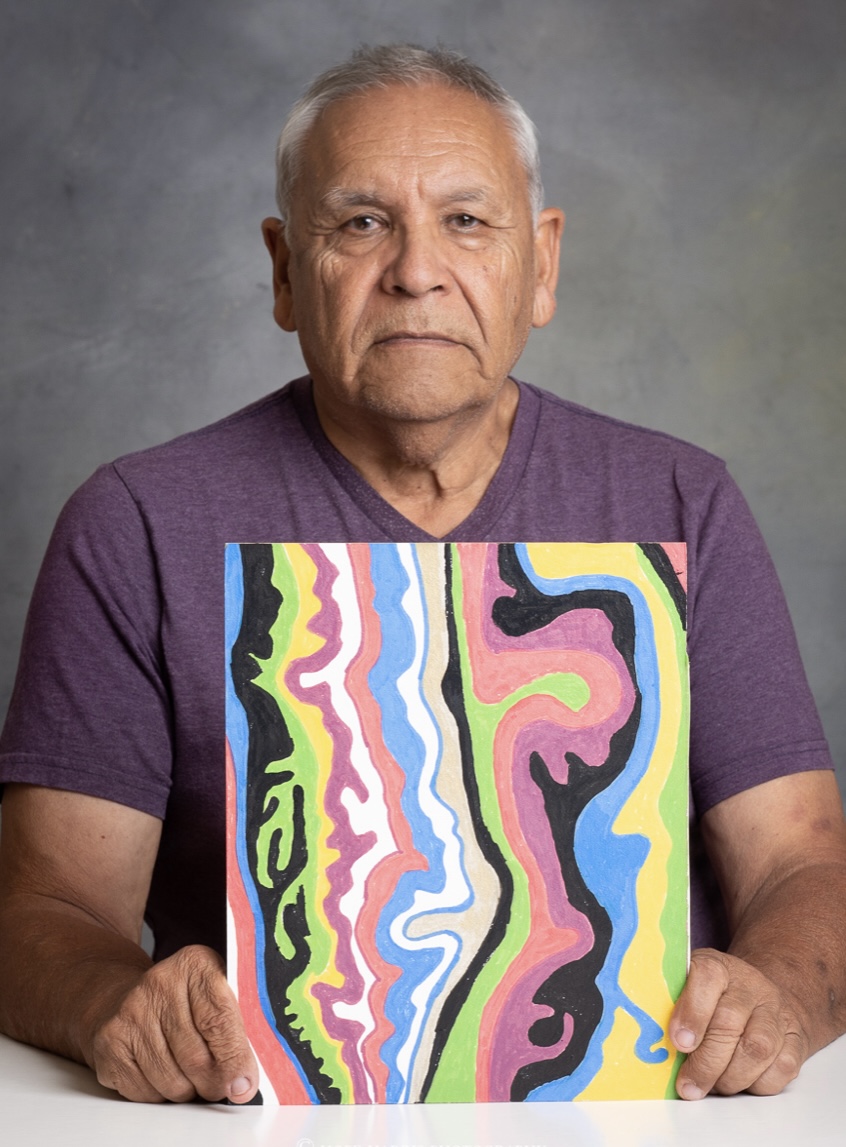
Share On Social!
A cool breeze hits Carlos Olivas III’s face and suddenly the smells of fresh, warm coffee and donuts hits his nose. He enjoys a short, tranquil moment at a bakery as part of his daily routine alongside his father, Carlos Olivas Jr., also known as Charlie.
Carlos is a full-time caregiver for Charlie, who is living with Alzheimer’s in Sacramento.
Carlos saw what caregiving looked like from a young age. He watched his mother and father care for his grandmother and, later, his father care for his ailing mother.
“My dad was the caregiver for my mom, who was dealing with breast cancer, diabetes, and congenital heart failure. In 2008, she passed. Reflecting back, that was the first time, the real hero,” Carlos said. “He set the stage as a male caregiver, without knowing what a male caregiver was.”
But when Charlie was diagnosed with mild cognitive impairment in 2015, Carlos and his brother said they “didn’t even know what mild cognitive impairment was.”
“We weren’t given any other kind of advice or guidance or idea of how to look towards dad and to support him with this diagnosis,” Carlos said.
After much consideration with his family, Carlos became the caregiver for Charlie. This launched a journey where Carlos would grow to be someone who speaks up for caregivers and help his father rekindle a love of art and share it on Instagram as @charlierobot.
But caregiving didn’t come easy at first.
Becoming a Caregiver Full Time
In 2015, Carlos moved back into his childhood home and made a tough transition to caregiver.
“At the time, I felt embarrassed, ashamed that I was taking a different role. There was a heavy stigma behind memory loss, the [perceptions] of people having these types of challenges,” Carlos said.
In 2017, Charlie was officially diagnosed with Alzheimer’s.
“That was a pivotal point because the reality sunk in, that something was definitely going on with dad. In many ways, there was a lot of denial, because my dad was showing, you know, that he could do a lot of things,” Carlos said. “But then there were also the times where he wouldn’t recall certain moments in his life, or even his short-term memory”
Still trying to figure things out, Carlos found help through the Alzheimer’s Association and joined a caregiver support group.

“I walked in, and there was no one that looked like me. Everyone was much older, there was a generational gap and most of the people there were women,” Carlos said. “I shortly became welcomed because I saw the significance of the support.”
Through his journey as a caregiver, Carlos experienced many trials, both within his family and during the COVID-19 pandemic.
“It was a struggle because a lot of the things that we normally did, things that were familiar to my dad were no longer or at least put on pause. We had to adjust, we had to adapt, we had to improvise and essentially overcome this deficit in our lives,” Carlos said.
Finding Support, Resources, and Support
Carlos is not only a caregiver, but someone who speaks up for those who can’t speak for themselves.
He volunteers with several organizations like the Alzheimer’s Association, Into the Dark Blue, Hilarity for Charity and the Walk to End Alzheimer’s Planning Committee.
“I’m also a volunteer for elder policy and bringing Alzheimer’s and related dementias to public leaders, lawmakers, so we can have more eyes on this, bring awareness to this this crisis that is projected to hit our people, primarily Hispanics/Latinos that don’t really talk about health understanding how to adapt,” Carlos said.
It isn’t always easy, though.
Carlos emphasized the importance of taking care of himself too.
“Sometimes I really get hard on myself because I feel that I’m not doing enough, I’m not doing the best I can be, Carlos said. “But then I have to really look inward and feel the need for a downtime, to rest, to recharge, to refuel, refocus and reframe myself towards a new day.”
Carlos often relies on support from his friend group, members of his different caregiver support groups, and other family members, like his daughter.
Through becoming a caregiver, Carlos has also learned so much from his father.
“In many ways, I feel that my dad is teaching me about Alzheimer’s,” Carlos said. “He’s teaching me about dignity, about compassion, and empathy. I listen to his wise words of wisdom. I try to normalize him in a way that uplifts and promotes encouragement to live life.”
The Origins of Charlie Robot
Carlos’ dad has always enjoyed making art.

Charlie spent many years working at a university in Sacramento as a technician in media services, and he often created pieces of art.
Following his Alzheimer’s diagnosis, Charlie stopped making art for a time.
However, in 2017, after some adjustments to his medication, Charlie began picking up the pencil again.
After Carlos showed his art to others, he was given the idea to make an Instagram account to display the many works of Charlie.
“I created an account on Instagram and began to share my dad’s artwork and how I care for dad and sharing, you know, the silly moments that is dad,” Carlos said.
The page handle, @charlierobot, was inspired by a nickname given to Charlie many years before.
“He was nicknamed Charlie Robot by one of his by one of our family friends, I want to say back in the 80s, she recognized that he was always busy,” Carlos said.

Since the creation of the page, Carlos has been able to connect with others around the nation and even the world who are sharing the same experiences.
“It opened up a community of dementia practitioners and other caregivers that I connect with, it became another support system,” Carlos said. “In my journey, I’ve met some amazing people who are, you know, coaches, occupational therapist, dementia practitioners, caregivers, caregivers who are no longer caring for a loved one.”
Through the page, Carlos was also able to identify with other Latinos and male caregivers who are supporting their loved ones.
“I am happy to kind of share my dad with the world. I’m happy to share his artwork,” Carlos said.
Carlos and his family are also set to be featured in a 2025 PBS documentary that features caregivers caring for a person living with a neurodegenerative disease.
“I hope that we spread the word about this disease, reflecting how to best serve our loved ones, and bring awareness to the burdens and the pitfalls, and the milestones, and the joys of creating memories with no regrets down the caregiver river,” Carlos said.
Adapting Routines
Everyday can look different for Carlos and Charlie.
Carlos has worked to implement routines for Charlie. Every Saturday morning, the two get together and spend time at the park to enjoy a sweet treat.
“Our routine is, go to the bakery, get a doughnut, and then we’ll go sit at a park along the river here in Sacramento and we have a little picnic. And we do that year-round, even when it’s cold and rainy, we’ll sit out there, chit chat, he’ll have his coffee and donut,” Carlos said.
You may also catch Carlos and Charlie getting their exercise by riding around on their beloved tandem bicycle, which they began doing during the pandemic.
“The last bike ride, we rode to a park, pulling a little bike trailer with some chairs and you know, a little cooler, full of stuff and we went to a little outdoor concert in the park,” Carlos said. “My dad loves music; my dad loves to dance. My dad loves seeing people, he understands that there’s energy there.”
Carlos searched for ways to also make sure he could take care of Charlie hygienically.
“I made an appointment to do a pedicure. I’d never had a pedicure before. So, we got there, dad immediately resonated with it reflected upon his days in Navy, where he got something like that, you know, pedicure, manicure, haircut at the same time. He felt comfortable,” Carlos said.
It was another way for them to spend time together doing something they enjoy and receive self-care.
Whether it’s taking a car ride together, or cooking a meal, Carlos adapts and does what he can to ensure his dad is taken care of.
“No matter if it’s just giving him a hug, or if it’s just wiping down the toilet seat to make sure that, you know, it’s clean and fresh, folding his clothes, making sure he’s got his medication. Those things are just the routines and we go through the motions,” Carlos said.
Advice to Caregivers
Carlos knows first-hand how daunting an Alzheimer’s diagnosis and caregiving can be.
His advice for other new caregivers? Reach out for help and seek out resources.
“There are some medical facilities that have caregiver support systems, education workshops on dementia,” Carlos said. “And then there’s like, social media, Instagram, Facebook, they have, you know, ongoing, people that are out there trying to educate the masses right now.”
Carlos also warned not to rely on just internet resources.
Contact medical professionals, specialists, and caregiver coaches to ensure how to best understand and care for others.
“Sometimes [social media and the internet] are not very helpful. You get bad information. There’s a lot of opinions about certain things,” Carlos said.
Being patient and learning something new every day is also part of the process.
“I practice some solitude to put some reins on my ego and that’s been hard. I’ve had to really work on my ego, especially in the beginnings because I thought I knew best, I thought I knew my dad,” Carlos said. “And I’ve learned more about my dad in the last eight years than their previous the 42-ish or something like that.”
Health and self-care as a caregiver are also crucial.
“If you’re not healthy yourself, through the main kind of things spiritual, mental and physical, you won’t be able to become a good caregiver to your loved one,” Carlos said.
Support for Latino Caregivers
Latinos make up a large group of people with different groups and backgrounds.
Today, Latinos make up 19.1% of the total U.S. population.
“I believe that we need to educate ourselves, Latinos, you know, it covers a wide amount of people with different heritage and backgrounds,” Carlos said. “There’s Afro Latinos, there’s anywhere from Puerto Ricans, Cubans to Salvadorians Colombians, you know, Brazilians, all the way up to Mexico and even [Native Americans].”
Carlos also highlighted the importance of Latino representation in healthcare.
“If you go to a doctor, and they look like you, they have an accent, they have a surname – I am more attached to that. So, I think reputation or [accounting for everyone] matters,” Carlos said.
Latinos must also face the misconceptions and stigmas in relation to things like health and caregiving.
“We need to recognize that there’s abilities to serve our loved ones in a compassionate way. Recognizing that, you know, family is all we have,” Carlos said.
Through the ups and downs of his role and as caregiver, Carlos wakes up every day and strives to make sure his dad is taken care of.
“I believe, at the end of the day, when I ask him, ‘What’s he grateful for?’ and he can respond by saying, ‘My two sons, my granddaughter, and that they’re taking great care of me,’ I could feel that my job’s done,” Carlos said.
Clinical Trials for Latinos Who Have Alzheimer’s
Participating in clinical trials is one way to help loved ones who have dementia.
Clinical trials are studies with volunteers that help researchers learn more to help slow, manage, and treat Alzheimer’s and dementia for current and future family members.
Without Latino volunteers, like Carlos and Charlie, the benefits may miss this group.
“Latinos in clinical trials are not only helping themselves, but they’re also building a future with better treatments that can help their families in the future,” said Dr. Amelie Ramirez, director of the Institute for Health Promotion Research and Salud America! at UT Health San Antonio.
Dr. Ramirez, thanks to a grant from Genentech, a member of the Roche Group, is raising awareness of clinical trials by using Salud America! to host webinars, showcase open clinical trials, and uplift the stories of Latino clinical trial participants.
Visit UT Health San Antonio’s Glenn Biggs Institute for Alzheimer’s and Neurodegenerative Diseases website to view their available clinical trials and eligibility requirements.
Search the Mays Cancer Center at UT Health San Antonio’s Find a Clinical Trial database to learn more about available clinical trials and eligibility requirements.
Seek a cancer trial anywhere in the nation here.
Visit our clinical trials page to find a clinical trial, read about heroes who have volunteered for clinical trials, and more!
By The Numbers
142
Percent
Expected rise in Latino cancer cases in coming years
This success story was produced by Salud America! with support from the Robert Wood Johnson Foundation.
The stories are intended for educational and informative purposes. References to specific policymakers, individuals, schools, policies, or companies have been included solely to advance these purposes and do not constitute an endorsement, sponsorship, or recommendation. Stories are based on and told by real community members and are the opinions and views of the individuals whose stories are told. Organization and activities described were not supported by Salud America! or the Robert Wood Johnson Foundation and do not necessarily represent the views of Salud America! or the Robert Wood Johnson Foundation.



